Fueled by the Grappling
By Alex Marzano-LesnevichWriting is notoriously hard. And writing about, as author Melissa Faliveno calls them, “spaces of uncertainty,” makes it even more so.
In this conversation, Faliveno talks with Bowdoin professor and writer Alex Marzano-Lesnevich about the struggle—and the satisfaction—that comes from the process of interrogating our obsessions and each other, and of writing our way in the world through stories.
IN FALL 2020, as the country was gripped by a series of unprecedented reckonings, Bowdoin students took a creative writing class designed to have them commingle their thinking about the political questions raging through the country and the personal changes in their own lives. Taught by Assistant Professor of English Alex Marzano-Lesnevich, the class—The Personal (Essay) Is Political—took its name from the canonical 1970 Carol Hamisch essay, “The Personal Is Political,” and featured works by classic and contemporary writers, including James Baldwin, June Jordan, Jennine Cápo Crucet, Kaitlyn Greenidge, and Melissa Faliveno, author of the essay collection Tomboyland, who visited the class electronically.
Tomboyland was the first book from writer and filmmaker Joey Soloway’s publishing imprint, and was named a best book of 2020 by NPR; the New York Public Library; O, the Oprah Magazine; and Electric Literature. Announcing plans for their imprint in February 2018, Soloway said, “We live in a complicated, messy world where every day we have to proactively re-center our own experiences by challenging privilege.” Like Soloway’s production company, the imprint would be directly named for its political aspirations: Topple. At the time, Soloway’s words were seen as a response to #MeToo, #TimesUp, and the global reckoning with gender inequality. But of course, by the time the imprint actually began publishing, far more reckoning was happening, with structural racism and with inequality laid bare by the pandemic. Tomboyland entered the world during that upheaval.
In January 2021, at a turning point in presidential administrations and as the global pandemic raged on at ever-escalating levels, Faliveno and Marzano-Lesnevich shared the following exchange.
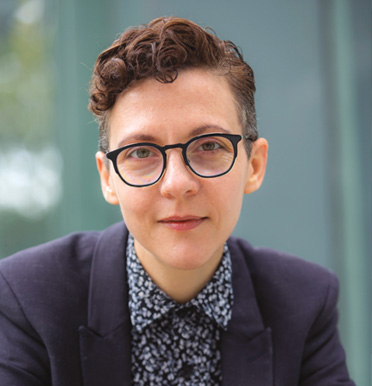
Alex Marzano-Lesnevich
Assistant professor of English
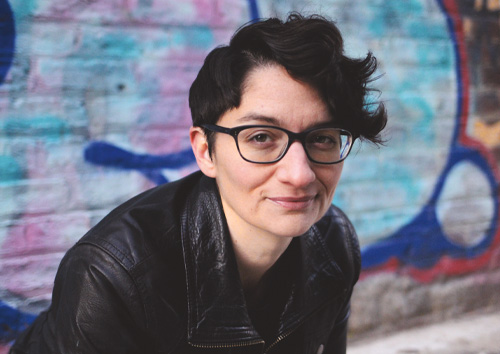
Melissa Faliveno
Author of Tomboyland
ALEX: How did Tomboyland begin? Did you know you were writing a collection?
MELISSA: I worked on this book for ten years. I always knew it would be a collection; it started when I was in the graduate program at Sarah Lawrence College, where I was studying the essay and working with my writerly magnetic north, Jo Ann Beard. It wasn’t really a book then, but a mashing together of very disparate essays—I knew it was at least in part a collection about the Midwest, but I didn’t know much else.
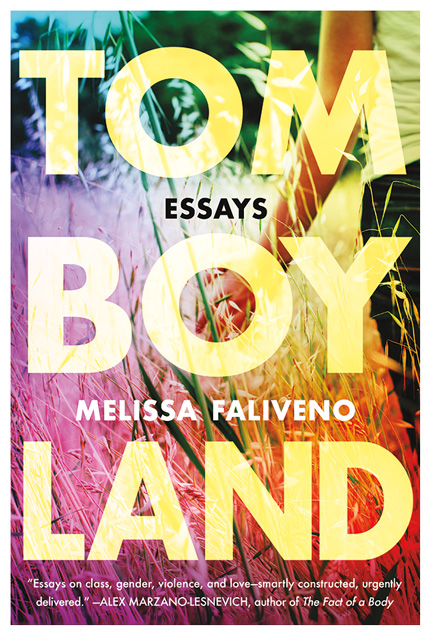
Two of the oldest pieces in the book—“Of a Moth” and an early version of “The Finger of God,” without any of the interviews or research, which was eventually published in Prairie Schooner—were part of my thesis. Jo Ann helped me see a little more clearly what I was writing about back then—the Midwest, girlhood, destruction, loss—and helped me believe that I could actually do this. As I continued writing over the years, after graduate school, eking out writing time whenever I could, I slowly started to think more about gender, and these questions of it. I started to write into that too, and into questions of class, and identity, and all these questions about selfhood that I was very much grappling with at the time. I began to realize it was also about the ways those questions intersect with this idea of “The Midwest,” and what it means to be “Midwestern”—about how place can create and complicate our identity, what it means to be “of” a place and then to leave it. When I got an agent, the brilliant Adriann Ranta Zurhellen, she helped me understand that the book was really centered around gender, and everything else— class, violence, the body, the land, guns, sex, isolation, tornadoes, moths—was all connected.
ALEX: You’re working in the personal essay form—a form that, of course, places the emphasis right away on the personal. What did it mean to you to have the book come out with an imprint whose focus is so explicitly political? How do you think about the relationship between the personal and the political in your work?
MELISSA: I really chose to work with Topple because of its mission. For years, as I worked on this book, I never really thought of it as a “queer” book. I’ve identified as queer for a long time now, but quietly; I think (and this is definitely some of my “Midwesternness” at play) I tried to keep my identity out of my writing. Which is ridiculous. Regardless of what form or genre you write, you’re bringing yourself to it—your experiences and questions and fascinations and fears, the things that keep you up at night. And the personal, it turns out, is always political, whether you want it to be or not.
After the 2016 election, I just felt something break open in me. I was furious, and scared—for my friends and my community and myself—and I started grappling with questions I’d never really taken a hard look at before: at the way I exist in the world, at how I’m perceived because of how my body moves through space. Of being pretty far left and coming from gun people in the working-class Midwest. Of the relationship between gender, class, and violence. When Topple was introduced, I remember being really excited by its mission—that it was helmed by Joey Soloway, that it was specifically dedicated not just to queer voices, but that it put trans and nonbinary writers of color at the very top of that mission statement. My editor, Hafizah Geter, is a queer Black woman who grew up in the Midwest, and as soon as we had a conversation about the book, I knew I wanted to work with her. She just got it, in a way so many other editors didn’t.
I ended up being the first title on Topple, and they’ve been super supportive, and have such a massive reach. In the end, I feel really lucky to have published with them—not just because this book has ended up in the hands of so many people it might have otherwise not, but because it’s an imprint whose mission is to literally disrupt the long tradition in this business of publishing books by mostly cis white people. To be a part of something from the ground up that says, “We’re going to do things differently.” I hope more publishers (especially the big ones) start to follow suit.
ALEX: The literary essay has its roots in the work of French writer and philosopher Michel de Montaigne; famously, the form comes from the French essai, often translated as “to test” or “to try.” Joseph Epstein has called personal narrative “the genre of discovery,” driven by movement toward something irresolvable or unknowable. And indeed, many of your essays seem to engage with a kind of grappling, the chasing of a central question or cluster of questions. Do you begin knowing that question, or how does discovery drive your work?
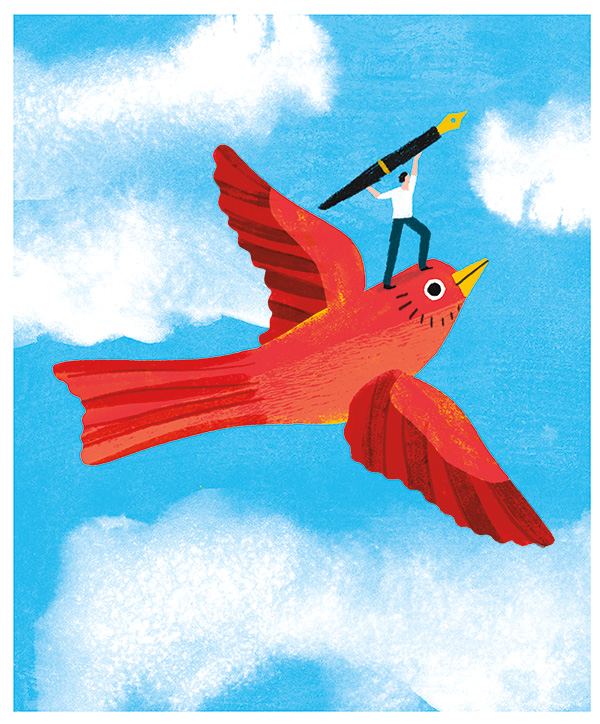
MELISSA: That element of the attempt, and of mystery—that driving at something inherently irresolvable or unknowable, digging around in the darker corners of the self and the world—that’s what excites me most about essays. All the best essays are fueled by the grappling itself; the author is working something out, trying to make sense of a question—even when they know they won’t find an answer. The grappling itself is the form. This is really what compels all of my work: there’s a central question, though I don’t always know what it is when I’m starting an essay. I know that I’m obsessed with something—an event, an issue or idea, an interaction, a memory—and I’m not sure why. So often I think I’m writing toward the question of, “Why am I obsessed with this?” From what and why was this fascination born, and what connections does it have to other parts of my life or the world that I’m not even aware of? That’s what I’m always trying to do, I think—ask the question, or maybe just figure out what the question is. I never really seek an answer—just better questions.
So much of Tomboyland is about learning to be more comfortable—maybe even at home—in those spaces of uncertainty: of the body, of society, of the spirit. Of allowing myself to inhabit those dimly lit spaces and look around as closely as I can to see what I can find. For an essay to be successful, to me, it should feel like the reader is on that journey of discovery with me. I want to share all the revelations, the inconsistencies and incongruities, and I want my reader to feel like they’re a partner in exploration, making those discoveries right along with me. One of the most exciting things about the essay is that you can find so much truth—about yourself, about the world—without ever finding an answer. That’s the real art of the form, I think, and to me it’s magic.
“Regardless of what form or genre you write, you’re bringing yourself to it—your experiences and questions and fascinations and fears, the things that keep you up at night.”
—Melissa Faliveno
ALEX: Another remarkable aspect of your work is how capacious the essays are. You make room for so much research, lyricism, even the voices of others. How do you go about assembling the scope or span of the essay?
MELISSA: I sometimes consider this my curse as a writer; I can’t seem to write any essay under 10,000 words. I never really know going into an essay what it will entail—I just follow a strand of thought, get lost in research, make some connection that’s really exciting to me, and then end up spiraling out. Then I have to reel it all back in somehow. For this book, I knew I didn’t want it to be my stories alone—I wanted other people’s stories too, for this kind of chorus of voices to create a tapestry of thought, of questions and conversation and exploration. Another thing that’s so exciting to me about the essay is that it can do so many things at once—it can do anything. So this marriage of personal essay, reportage, interview, research—that’s always been the form that I’ve been most interested in, from back to my days writing features for an alt weekly in Madison, Wisconsin. Basically, I just love sitting down with people and asking them about their lives, and their memories, and their struggles, and their obsessions, and then figuring out how those stories and understandings and experiences intersect or diverge from my own, and what we might learn from those connections.
ALEX: By the time you wrote these essays, you had traversed two American extremes, moving from Mount Horeb, Wisconsin, population 2,000, to taking on the life of a magazine editor in Brooklyn. How did that traversal inform the essays? Does place inform what you think of as political?
MELISSA: Absolutely. You know, I didn’t realize it at the time, but that connection—between place and politics in my essays—didn’t really hit me until I’d been gone from Wisconsin for a few years. When I moved to New York, and found myself at a small, private, liberal arts college—light-years away from a life of public education in Wisconsin—I found myself feeling like such an outsider. I went to school with people whose parents had PhDs, and mine didn’t even have college degrees. I went to literary parties and felt like such a yokel. I had spent a lot of time in my twenties longing to leave Wisconsin—I traveled abroad a lot and wanted to write about anything other than my home state. And then when I moved to New York, I started to feel very fiercely attached to that home. Especially after Trump was elected, and good liberals and East Coast journalists started talking about Midwesterners—especially working class Midwesterners like many of my family and friends—like they were all idiots, all gun-toting rednecks who voted against their interests. And I didn’t always disagree, but this reductive generalizing of a whole swath of people—it never sat well.
So I wanted to interrogate the parts of the Midwest—or my Midwest, anyway; the rural, working class, mostly white part—in all its complexity; the parts I love and the parts I hate, the parts that seem contradictory, that confuse me. And to write from my vantage point as one who is from there but apart from there now, who is deeply dedicated to progressive politics but who loves, and is loved by, conservative people. I wanted to write into that complexity of place and politics with a critical but open eye.
ALEX: What was it like to have a first book come out in such an unprecedented and complex year?
MELISSA: It’s certainly been interesting! Some of it was great—the book got way more attention than I expected, and I was able to do more interviews and podcasts from my apartment in Brooklyn than I might have been able to do otherwise.
What we're doing as writers is not just an art, or a job; it’s also a means of progress and change and hope.
But some of it was so sad, too: what I wanted most of all when this book came out, what I’ve always dreamed about, was to celebrate this ten-year process and lifelong goal with all my family and friends, here in New York and in Wisconsin and across the country—with people who were so important to the creation of this book (and many of whom are in it).
But with a virtual tour I think more people were able to show up, which was a gift. It was sometimes difficult to navigate where this book fit, or to see its purpose, during a time of great social upheaval and racial reckoning, but I received so many messages from queer people, from the Midwest and all over the country, who told me what it meant to them, that they felt seen for the first time, that they felt less alone— so that was a useful reminder. But this year definitely made me more aware of the work I need to do to better interrogate whiteness and privilege, in myself and in the places I come from, and how I might address this in my writing more directly.
ALEX: What role does creative writing have to play in political change, in imagining a new world—and maybe, as we’ve been discussing, a new awareness of, and engagement with, complexity and difficulty—into becoming?
MELISSA: Creative writing has always played an important role in effecting political change—in helping people learn and grow and better empathize with one another, and right now I think we’re seeing that so directly, in the literature about systemic racism and other social injustice in America. I feel like problems that many people have been made painfully aware of, and struggling against, for generations are finally working their way into the consciousness of more Americans, especially white Americans, and you can almost track that by the books being bought and read in our country right now.
It’s hopeful, to me, and helps me realize that writing can be such a powerful—such a critical—tool in political and social change, in helping people evolve as thinkers and humans, maybe even in changing minds; in helping people better understand experiences outside their own race or gender or sexual orientation or ability or socioeconomic status. I try to keep this in mind when I write and when I teach—especially when I’m feeling cynical about the world: that what we’re doing as writers is not just an art, or a job; it’s also a means of progress and change and hope. Language, words, art, books—it’s all a tool of communication, of connection, of empathy, of protest. Of imagining a better world. It can also be a weapon, as the outgoing president and his supporters have proven time and again, with the ability to cause great harm, incite violence, drive us further apart. I think it’s our job as writers to strike back, to wield that weapon for good.
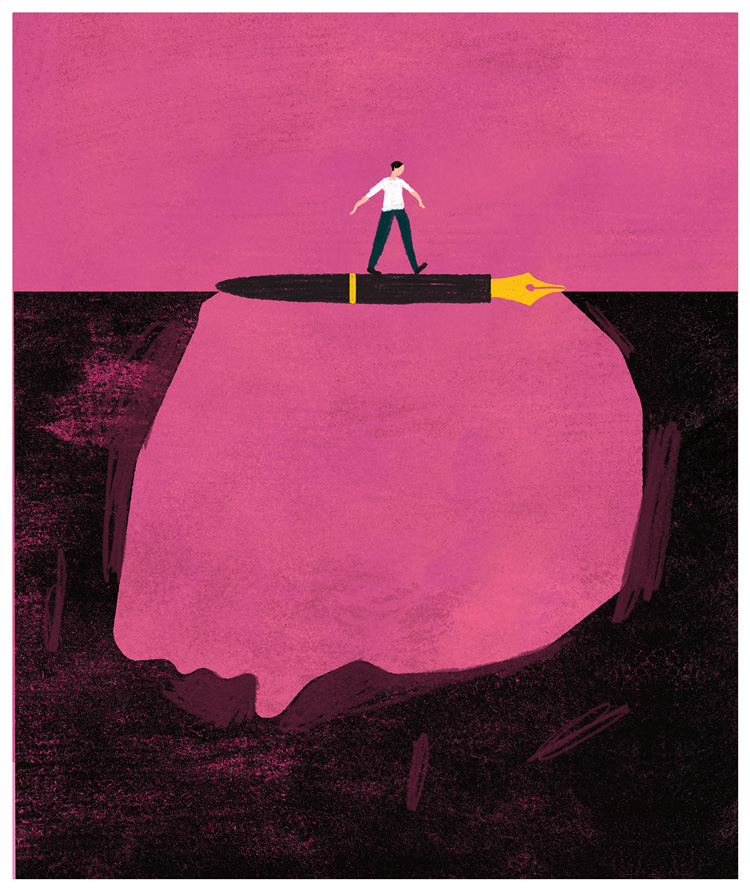
ALEX: As a professor at the University of North Carolina–Chapel Hill, a guest lecturer in classes like The Personal (Essay) Is Political, and formerly the senior editor of Poets & Writers, you spend a lot of time engaging with the work of younger writers. As you mentioned, you were a first-generation college student yourself. Why do you feel reaching college students with this form in particular is so important?
MELISSA: When I went to college, at the University of Wisconsin—a public school, with in-state tuition, where I worked several jobs to help pay my way through and still racked up debt I’m still paying off—I never really believed that I could “be a writer.” I knew I wanted to write, but I didn’t know how. When I took my first creative nonfiction workshop, it was a revelation—I knew immediately that I wanted to write essays. That this wildly exciting combination of personal narrative, cultural reportage, politics, social issues, humor, drama, and interrogation, was what I wanted to do with my life. But I didn’t believe I was the kind of person who could do it. Not as a job, anyway. A life of creative and scholarly work seemed another world away, something reserved for a different kind of person.
And I guess, these days, when I work with young essayists—as well as aspiring essayists who aren’t young, who have lived whole lives and had whole careers and families before pursuing a dream—I want them to know it’s possible. That they can do this. And I want to help them look at the world as essayists—to explore it, to make discoveries, to seek the thrill and miracle in that. To read and observe the world and ask questions of it—to practice this form, in all its weirdness and complexity, and get experimental. To find and explore the essential queerness in the essay as a form.
Mostly, I want them to know that their voices, and experiences, and lives, and questions, and stories are important. That they can write those stories down, and people like me will read them.
Alex Marzano-Lesnevich is an assistant professor of English and award-winning author of The Fact of a Body: A Murder and a Memoir. They have written for The New York Times, The New York Times Sunday Magazine, The Boston Globe, Oxford American, and Harper’s.
Keith Negley is an award-winning illustrator and instructor living in Bellingham, Washington. See more of his work at keithnegley.com.
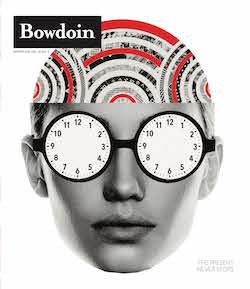
This story first appeared in the Winter 2021 issue of Bowdoin Magazine. Manage your subscription and see other stories from the magazine on the Bowdoin Magazine website.